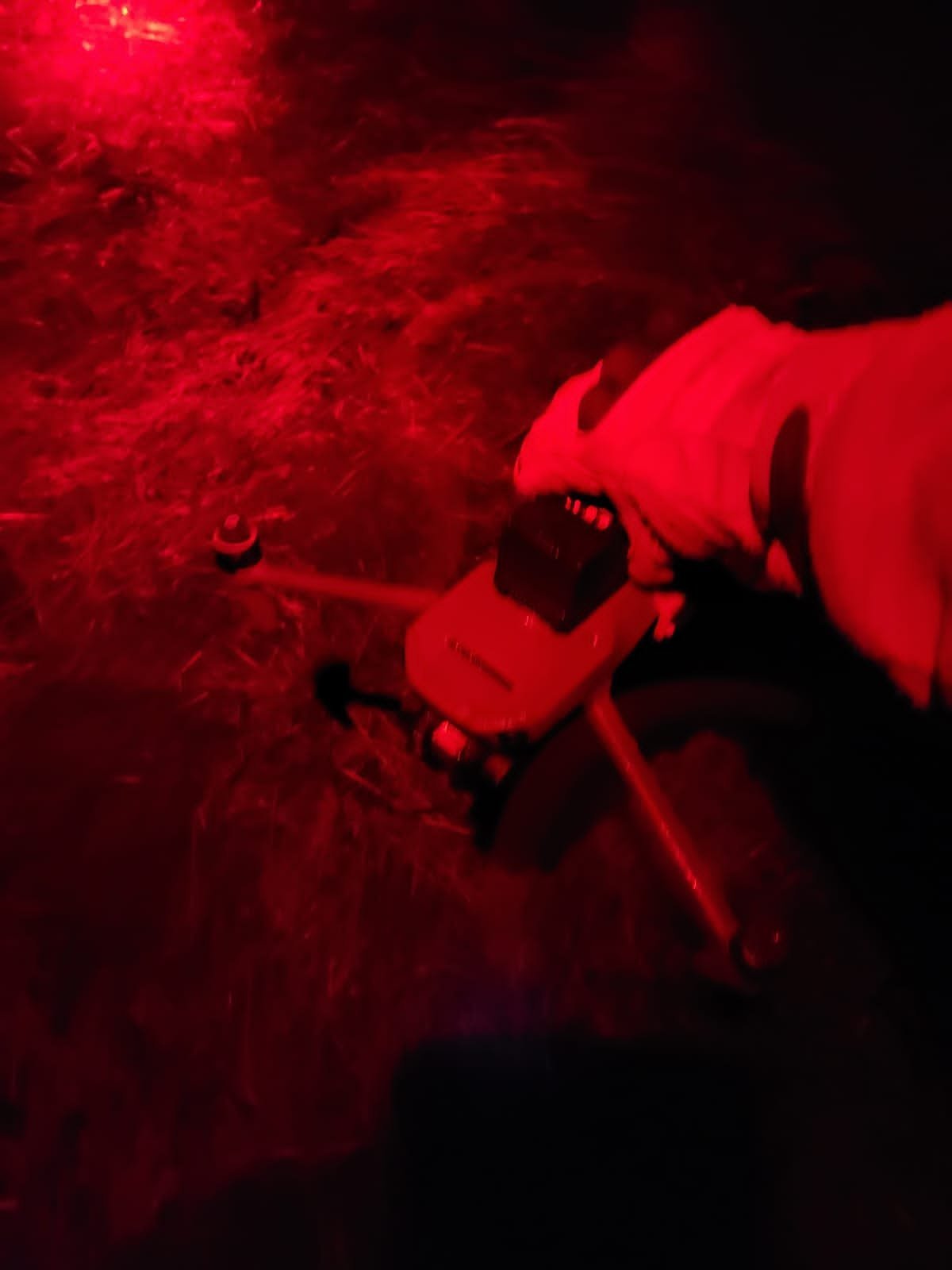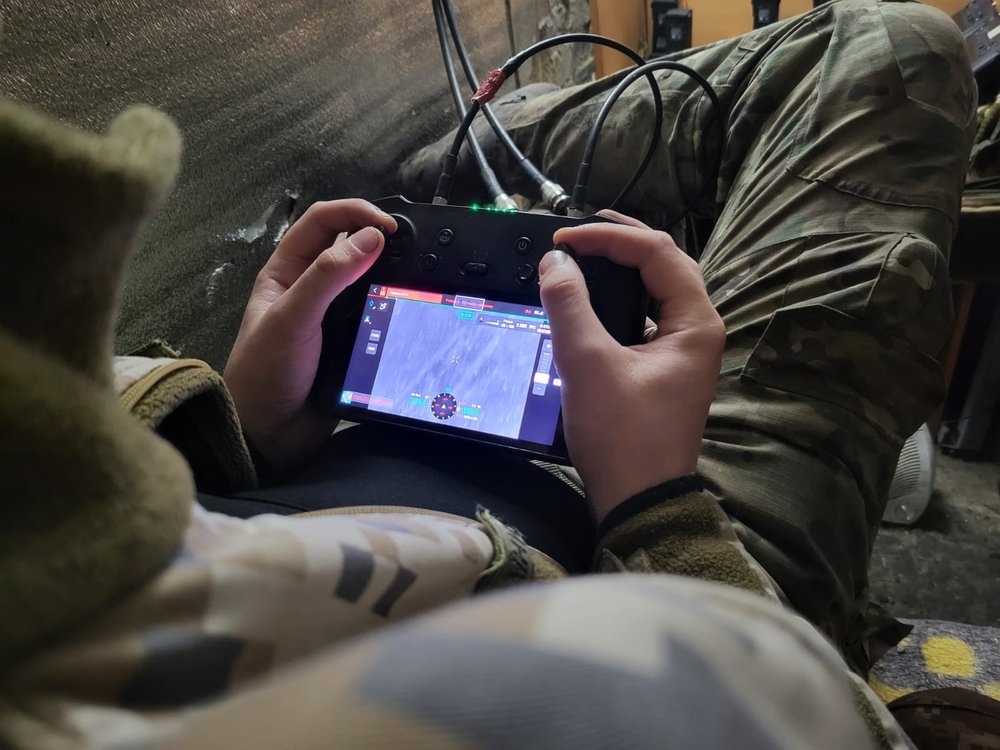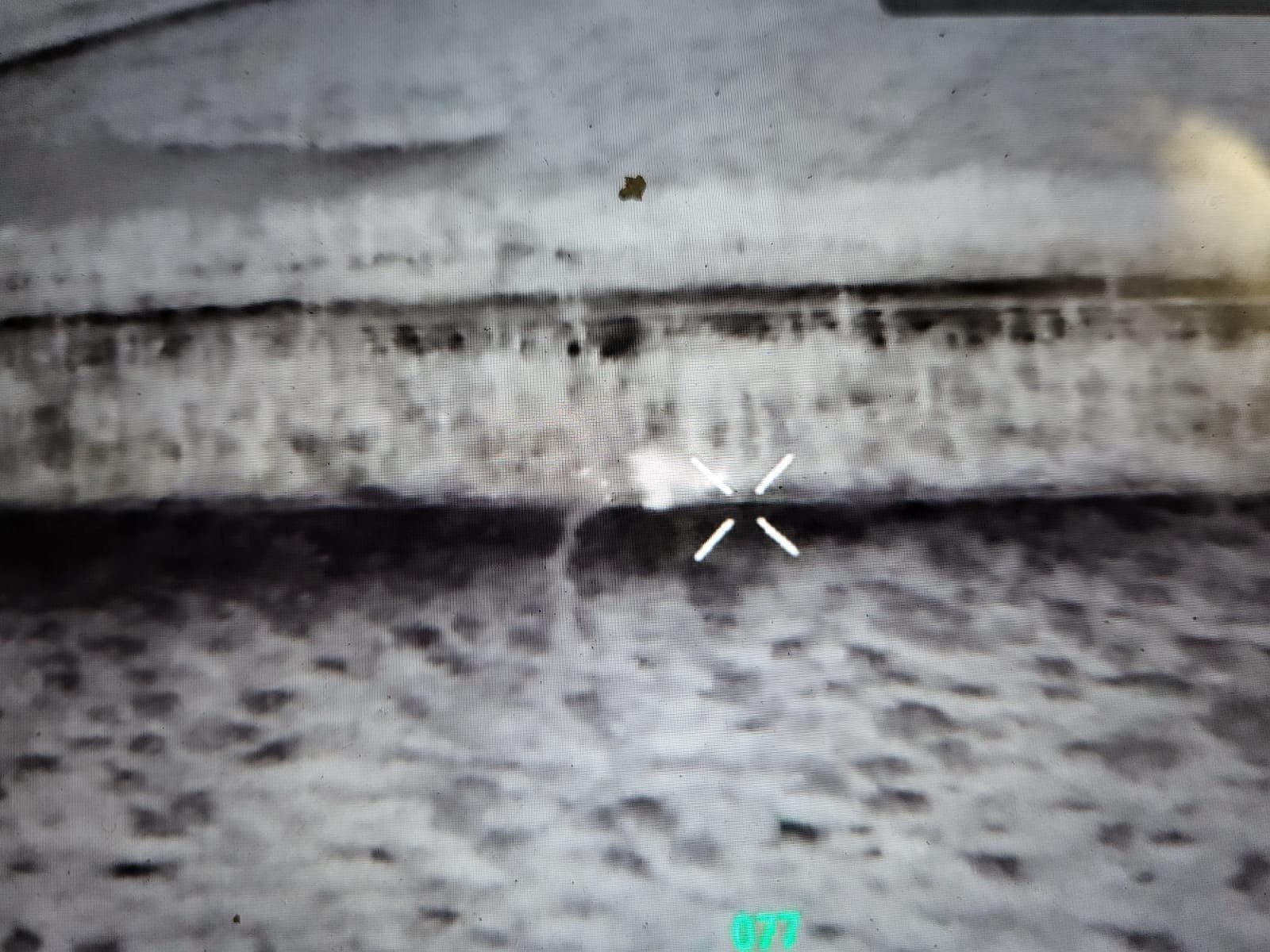Eyes of the Gods: How Aerial Recon Guides Artillery to Enemy Attacks
"The bastards are on the move. Moving fast. Adjustments needed. While they march, you count the seconds and pray for the shell to hit its mark in time. Flying in strong winds is nerve-racking. On one hand, the risk of losing the drone and being left 'blind' until a replacement arrives is high. On the other, right now, someone's son, brother, sister, mother, or father might be dying at the front lines."
Читати українською
The cold is biting. Outside, the wind howls, and pre-dawn darkness engulfs everything. Leaving the warmth of a sleeping bag seems insane, but it's time to get up. Phones aren't just alarms; they scream with urgency, each tone more grating than the last. The air is thick with the smells of damp, mice, sweat, and dirty combat boots.
Wake-Up Call at 4:30
Someone, maybe Sergei, shouts a customary "Wake up!" in the darkness, instantly making the tiny room feel cramped. A switch clicks faintly, and cold LED light floods the space.
Getting dressed in winter gear in such tight quarters is a challenge, but again, time waits for no one. All the UAV-based Artillery Reconnaissance and Control (UARC) gear — tablets, drone batteries, phones — were charged the night before.
From outside, the whine of a starter, then the diesel engine spews its first blue plume of smoke, swept into the room by the wind.
Rifle bolts click, Velcro rips as bulletproof vests are donned, and someone swears quietly under their breath.
The commander speaks softly: "Time, guys. Time to depart."
One of the soldiers, pulling on a fleece cap, asks quietly: "What about coffee and croissants?"
But the team leader isn't in the mood for jokes:
"You'll have time for coffee. Let's go."
Another workday for the UARC begins.
At the wheel of the pickup, once blue, the driver, furious as a pack of dogs, curses: "Damn it, let's go!"
The commander takes one last look at the team and orders: "Take your positions."
The pickup breaks the thin ice on the puddles as it speeds off.
The usual exchange of insults starts and quickly fades under the sound of the suspension taking hits from the first potholes. The engine roars, the headlights, somehow shining through layers of dirt, barely illuminate the morning road.
As dawn breaks, the surrounding landscape becomes visible only through the windshield: the closer to the front, the more bomb-damaged buildings, charred remains of vehicles, and armor. Aerial reconnaissance operates behind the front lines, but it's still within the enemy's visibility range, who sees everything happening within about 10 km of the front.
No fog means we need to push the "workhorse" to its limits, as there's a high risk of an anti-tank guided missile (ATGM) or a kamikaze drone strike.
We`ve been spotted, night illuminated by explosions
We've been spotted, and sudden explosions light up the night, giving the ground a moonscape appearance. Another blast nearby rocks the vehicle — the impact is close. The headlights go off, and the pickup makes its last, nearly blind leaps before screeching to a halt.
A shell lands far but guarantees nothing, so we unload quickly — any delay could cost the vehicle, health, or even lives. The pickup reverses sharply and quickly disappears.
The Dugout
Under the dim light of distant red lanterns, we rush, laden like camels, and dive into the darkness and mustiness of the dugout—our potential shelter. The dugout, deep and secure, was recaptured from the Russians a few days ago. The commander raises his hand, and a cold white light from a cleverly attached lantern hits everyone's eyes.

In a corner lie sleeping bags, green ration packs, some coats, and surprisingly, a pile of candy, already well-nibbled by mice. It's all Russian, and its former owners won't need it anymore.
Outside, the whistling and explosions of 82mm or 120mm mines continue.
No one plans to stay in the dugout permanently since the Russians know its location. It's only a matter of time before it's hit. So, after catching our breath, we grab the sleeping bags and move on.
Alina and the Wind
Here's the position, also concealed. Aerial reconnaissance team sets up their equipment, powering up tablets. The drone operator, a girl named Alina, a lawyer in civilian life, swears quietly:
"All good, but this wind... Everything else is fine."
The team commander, biting his lip, falls silent for a few seconds, then says:
"Good. Report that we're connected and waiting for better weather. Meanwhile, I'll make us some coffee."
As the wind howls above and the ceiling shakes from mine and shell blasts, the aerial reconnaissance team finally settles for breakfast underground. Metal cups clink under the impact of another GRAD barrage, and a dark-green lid of a trophy ammo box from the munitions clatters shut. The smell of hot coffee and fresh bread fills the air. On the makeshift table, unevenly cut slices of sausage, cheese from yesterday's volunteer supply, obligatory pork fat, onions... The coffee is bitter and hot. But eating proves difficult.
The radio comes to life:
"UARC, to the first!"
"UARC, standing by."
"No rest for the bastards this morning. We intercepted their plans: they're planning to bombard with artillery all day, then just enter the trenches in the evening and shoot everyone."
For a few seconds, silence falls. The commander sets aside his half-finished mug of coffee.
"Got it. That's enlightening."
And to Alina: "How's the weather?"
Alina, peeking out, shakes her head sadly:
"Same crap. The wind isn't letting up."
The first attempt to launch the drone fails: a gust of wind blows it aside, nearly breaking it. After inspecting the drone, Alina finds that one of the propellers needs replacing. Fortunately, there's a spare. Somewhere, field mice squeak and scratch at the walls. They're numerous, and what to do with them is unclear, but that's not the concern right now.
Three hours pass in strong winds and under fire.
For the uninformed, it's just 180 minutes. The length of several album plays on a road trip or one part of a movie like "The Lord of the Rings."
But here, at the front, three hours without a drone mean dozens of casualties. It means missing a Russian attack. It means... In short, it's bad.
Flying in strong wind is nerve-racking. On one hand, there's a high risk of losing the drone and being left 'blind' until a new one arrives. On the other, right now, at the front lines, someone's son, brother, sister, mother, or father might die. Today, without aerial adjustments, without aerial reconnaissance, both the offense and defense are suffocating.
The lives of our soldiers are more valuable than plastic, but even plastic has its limits.
The artillery doesn't cease, and the Russians spare no shells. We sit quietly, because, as the UARC members say, "when they detect groups with drones, they won't even spare a KAB. They'd hesitate for a BTR or a 'beha' (BMP, infantry fighting vehicle), but not for us."
For those not in the know, a KAB is a guided aviation bomb. A 500 kg behemoth, 380 kg of it being explosive. Dropped from a distance of about 90 kilometers, it whistles if far and hums if close. You have seconds to recognize it.
It explodes loudly, with a ringing, and the shock shakes the ground, knocking the breath out of you, even if it's far. A crater big enough to hide a tank is left behind—twenty meters in diameter and up to five deep.
We sit, wrapped in trophy sleeping bags that smell of chemicals, listening to the thunder of explosions.
…As noon approaches, the wind calms down, and lifting the "bird" becomes much easier. Alina takes the controller. The spotter, hefty in his dirt-darkened camouflage, looks around and secretly blesses the "Mavic."
"Clear prop!"
The drone's propellers buzz, and it ascends heavily, as if climbing a cliff.
It's a three-minute flight to the operational area. Headquarters confirms today's task—monitor the buildup of Russian assault groups.
Orcs
And just five seconds after the broadcast begins, seven black dots appear on the screen: Russians are moving in a line, roughly a meter apart. The spotter taps the tablet.

A young but hoarse voice of the commander of one of the artillery units comes over the air:
"Yeah, I see it. There's the dot. Shall we fire?"
"Yes!"
Thanks to software like "Nettle," guiding the artillery to the target is not the hardest task, but every second stretches into an hour.
The bastards are moving. Moving fast. Adjustments are needed.
At the firing position, the battery commander receives the firing data. His command is heard:
"Fire!"
The flight time of the shell is 30 seconds. As the bastards move, you count the seconds and pray that the shell manages to destroy at least someone.
The first ranging shot overshoots. The shell's flight time is 30 seconds. As the enemy advances, you count each second, hoping the projectile finds its mark in time. The first ranging shot overshoots its target.
Adjustments are broadcast—two sets of five digits.
"Fire!"
This time, a 155 mm cluster munition scythes down everyone gathered for the attack. The group of seven lies motionless.
An hour passes. The drone intermittently ascends and descends. At last, Alina sees a new formation entering the tree line. They're waiting for dusk, hoping for bad weather. Snow and wind—a perfect opportunity for the Russians, and they're eager to exploit it. A brief report crackles over the air:
"Targets at the edge of the woods and at the start of the plantation, coordinates incoming."
The same officer responds with a smile:
"Understood, I see them, aligning now..."
Again, 30 seconds stretch into an agonizing 30 minutes. An explosion in the plantation—the artillery strikes with a cluster shell.
And then another.
A third explosion hits right in the trench
The Russians take cover, making no further movements.
A third explosion hits right in the trench, from which a cloud of smoke and flames erupts.
Artillery Strike
Now there's a chance to rest, but another barrage begins. The explosions are getting closer. The commander explains:
"One of the worst things is to become a 'scheduled target' for enemy artillery. There you sit, focused on your job, camouflaged so no one can see you... The enemy doesn't know exactly where we are and fires indiscriminately, yet heavily, and you, like a fool, just wait for something to land on your head.
This is war, that 'fog of war', where nothing really depends on you
They just stupidly hit a square, and you realize: a 152 mm shell might just land on your head, and that's it... And if you emerge, it's even worse, because they’ll see you... This is war, that 'fog of war', where nothing really depends on you."
Time passes. The shelling subsides. There's a chance for a smoke break and to open a packet of some porridge from the ration pack.
Then again, a whistle and a blast. It lands close. Another explosion. And another...
Sand falls into the porridge, a stunned mouse tumbles at our feet, and the only thought in the head is an expletive.
The radio crackles:
"Can you see where they're shooting from?"
"What the hell kind of 'can you see' is this! You can't even get airborne here!"
Finally, silence falls.
Interception
Alina checks the batteries, glancing at the clock…
The flight schedule is known: three minutes to arrive, three minutes to depart, and the “Mavic” works for 17 minutes.
Takeoff. Russian electronic countermeasures (ECM) begin, but Alina knows how to evade them. Swears hang in the air. Alina, from the occupied part of Ukraine, can only describe her feelings towards the Russians with obscenities.
She spots the target again—a group of Russians sneaking through the plantation. Our artillery goes into action again, but this time, out of six targets, only three are laid to eternal rest. And shells are expensive; allies can't produce them fast enough.

Battery replacement. Takeoff.
Artillery.
Wind.
Coffee.
Artillery.
Another group of Russians detected.
"I see them. Fire!"
30 seconds… Explosion. Explosion…
Finally, an interception: "Cease movement, everyone take cover."
This means they've had enough of our metal for today.
Another day at war draws to a close...

